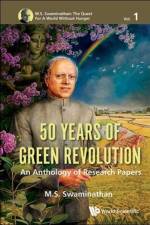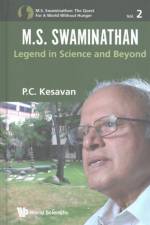von P C (M S Swaminathan Research Foundation Kesavan
158,00 €
This unique volume is not just an in-depth analysis of Professor Swaminathan''s brilliant contributions to basic cytogenetics, radiation biology, mutagenesis and genomic affinities of cultivated potato and its wild derivatives, but also the application of the new knowledge gained to improve the productivity of agricultural crops, as also to enhance their resistance to a variety of biotic and abiotic stresses. No other earlier biographies of Professor Swaminathan bring out these salient dimensions of his scientific achievements made at the Wageningen University, The Netherlands, Cambridge University, UK, and Wisconsin University, USA as well as Indian Agricultural Research Institute (IARI), New Delhi. This biography is also unique for its revelation that Professor Swaminathan''s contributions par excellence have been in contemporary areas of crop improvement for productivity and resistance to pests and diseases.This volume is also unique in bringing out that Professor Swaminathan, Father of India''s Green Revolution, wanted to use this chemically intensified system only to gain ''breathing space'' and went on to propose a ''systems approach'' ΓÇö based evergreen revolution in order to ''achieve productivity in perpetuity'' through various pathways of ecoagriculture, and also integrated it with avenues for on-farm and non-farm livelihoods. Towards this goal, he made innovative uses of ecotechnologies in a ''biovillage'' paradigm and modern information and communication technology (ICT) in Village Knowledge Centres (VKCs) to provide skill and knowledge empowerment respectively of the resource-poor rural women and men towards sustainable management of the natural resources for creating income-generating on-farm and non-farm livelihoods. This volume also brings out how Professor Swaminathan elegantly combined intellect and labour (hard work), and professional zeal with compassion for the poor. He is always open to new ideas, and new technologies without of course, compromising the values of traditional knowledge and ecological prudence of the rural and tribal people. This volume nicely captures how Professor Swaminathan with a deep and comprehensive understanding of the threats to the ecological foundations of agriculture and sustainable rural development, environmental degradation, social inequities and the climate change risks, has also harnessed science and technology to convert challenges into opportunities. This volume is written in a manner to serve also as a text book, going beyond the scope of just a biography. That should benefit generations of students on one hand, and sustain an interest in the book for many years on the other.


